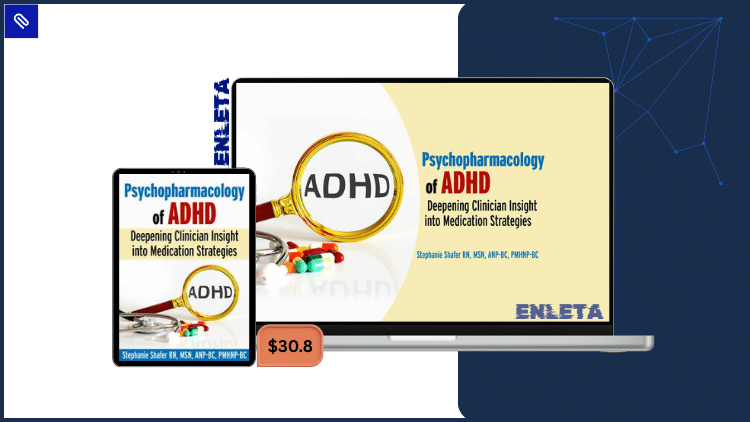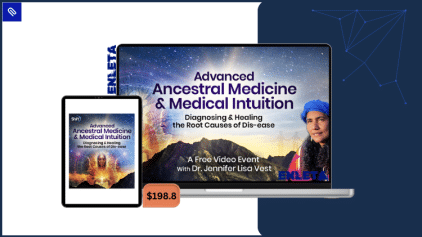Psychopharmacology of ADHD: Deepening Clinician Insight into Medication Strategies by Stephanie Shafer – Instant Download!
Psychopharmacology of ADHD: Deepening Clinician Insight into Medication Strategies is a continuing education program by PESI, taught by Stephanie L. Shafer, MSN, ANP-BC, PMHNP-BC. The course offers advanced, up-to-date review of both stimulant medications (such as methylphenidate and amphetamines) and non-stimulant medications (like atomoxetine and guanfacine) used in the treatment of Attention Deficit Hyperactivity Disorder (ADHD).
This CE activity is designed for clinicians—including psychiatrists, nurse practitioners, physician assistants, family medicine and neurology practitioners—who wish to deepen their understanding of the neurobiology of ADHD, medication mechanisms of action, side effect profiles, and strategies to tailor pharmacotherapy to individual patients. The program is delivered in roughly two hours (about 2.0 CE credits in pharmacology) as an enduring activity, covering presentation, differential diagnosis, medication selection, combination strategies, monitoring, and outcome evaluation.
Psychopharmacology of ADHD: Deepening Clinician Insight into Medication Strategies by Stephanie Shafer Free Download – Includes Verified Content:
PDF Sample – Psychopharmacology of ADHD: Deepening Clinician Insight into Medication Strategies by Stephanie Shafer, watch here:
Why Should You Choose This Course?
Clinicians frequently search for long-tail solutions such as “how to individualize ADHD medication strategy for adult patients with comorbid anxiety” or “best practices in combining stimulant and non-stimulant ADHD medications for treatment-resistant cases”. Psychopharmacology of ADHD: Deepening Clinician Insight into Medication Strategies addresses these needs by offering evidence-based knowledge about medication classes, combinations, and clinical decision-making.
Another strong reason is that ADHD treatment is not one-size-fits-all. Each patient may respond differently depending on age, comorbid disorders, history of response, side effect tolerance, lifestyle, and underlying neurobiology. This course focuses on differentiating ADHD from common differential diagnoses, understanding symptom presentation, and adapting medication strategies accordingly. Such detailed guidance is essential if you’ve ever looked up “how to manage ADHD when patient also has sleep disturbance or mood disorder” or “how to mitigate side effects of ADHD medications in adolescent patients”.
Also, understanding pharmacology at the mechanistic level—how stimulants affect dopamine and norepinephrine systems; how non-stimulants act on α2A receptors or other pathways—enhances ability to explain treatment rationales to patients, monitor outcomes, and anticipate side effects. Clinicians searching for “how ADHD medications alter brain chemistry and how that relates to side effect risk” will benefit. Moreover, the course is accredited and offers continuing education credit, making it useful not just for knowledge but professional credentialing.
What You’ll Learn
By completing Psychopharmacology of ADHD: Deepening Clinician Insight into Medication Strategies, participants will gain the following competencies and actionable knowledge:
-
Understanding Neurobiological Basis of ADHD: Neurotransmitter systems (e.g., dopamine, norepinephrine), implicated brain regions, genetic and environmental factors contributing to ADHD, which help in conceptualizing personalized treatment strategies.
-
Comprehensive Review of Stimulant Medications: Pharmacodynamics and pharmacokinetics of methylphenidate and amphetamine formulations; differences in onset, duration, side effect profiles; when to choose immediate- versus extended-release stimulants.
-
Non-Stimulant ADHD Therapies: Mechanism and clinical application for medications such as atomoxetine, guanfacine; understanding when non-stimulants may be preferred (e.g., concerns about abuse, side effects, comorbid conditions).
-
Medication Combination & Synergy: How to consider combining medications, augmenting strategies, switching from one medication to another, handling partial responders, adjusting doses.
-
Differential Diagnosis & Tailoring Treatment: Distinguishing ADHD symptoms from overlapping conditions (e.g. anxiety, depression, sleep disorders, substance use); evaluation of patient history, psychosocial stressors; making medication choices that consider patient profile.
-
Evaluating Treatment Outcomes and Monitoring: Metrics for assessing improvement in attention, hyperactivity, impulsivity; monitoring for side effects (cardiovascular, sleep, appetite); adjusting medication dose or regimen based on outcomes; follow-up strategies.
-
Risk-Benefit and Side-Effect Management: Understanding common side effects (insomnia, appetite suppression, cardiovascular risk), less common risks; how to minimize risk; patient education about what to expect; how to handle adverse reactions.
-
Clinical Case Applications & Decision-Making Frameworks: Realistic cases to apply learned pharmacological strategies; decision trees or algorithms for choosing medications; when to refer; considerations of patient age, lifestyle, comorbidities.
These outcomes align with long-tail professional goals such as “how to design ADHD treatment plan that balances effectiveness and minimizing side effects”, “how to adjust ADHD medication in presence of comorbid disorders”, or “how to improve daily functioning in ADHD via pharmacotherapy with personalized dosing.”
Who Should Take This Course?
This course is ideal for:
-
Psychiatrists, Nurse Practitioners, Clinical Psychologists, Physician Assistants who prescribe ADHD medications or collaborate in medication management.
-
Primary Care Physicians and Neurologists who frequently see patients with ADHD symptoms and may initiate or manage treatment before referral.
-
Mental Health Professionals in Private Practice or Clinics needing up-to-date knowledge on ADHD pharmacotherapy, especially clients asking about medication options or complaining of side effects.
-
Resident Doctors, Fellows, Graduate Students in psychiatry, psychology, nursing, or neurodevelopmental disorders who want deeper understanding of ADHD medication strategies.
-
Clinicians dealing with complex ADHD cases, including patients who are partial responders, have comorbid psychiatric or medical conditions, or who are concerned about medication safety and long-term outcomes.
-
Providers seeking continuing education credits in psychopharmacology who want evidence-based learning with practical applicability and useful decision-making frameworks.
Conclusion
Effective pharmacological treatment of ADHD requires more than selecting a medication—it requires nuanced understanding of neurobiology, patient presentation, medication mechanisms, side effect profiles, and personalized treatment planning. Psychopharmacology of ADHD: Deepening Clinician Insight into Medication Strategies offers clinicians a comprehensive, research-based training that builds these competencies. With this course, practitioners will be better equipped to interpret presenting symptoms, select appropriate stimulant or non-stimulant therapies, combine or adjust medications as needed, and monitor outcomes in a way that improves daily functioning and patient quality of life.
Advance your clinical expertise — enroll in Psychopharmacology of ADHD: Deepening Clinician Insight into Medication Strategies and enhance your ability to prescribe, manage, and optimize ADHD medications for better patient outcomes today.











Reviews
There are no reviews yet.